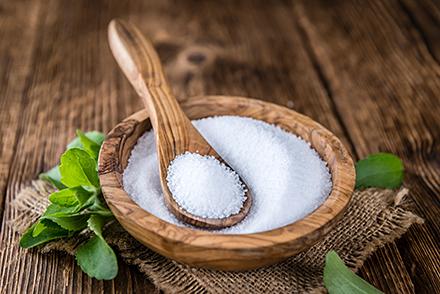Natural Sweetener Stevia Makes a Gutsy Comeback

Photo courtesy of Adobe Stock Photos
Popular sweetener stevia found to have no negative effect on human gut health
Good news for consumers seeking healthy sugar substitutes! ARS scientists with the Dairy and Functional Foods Unit in Wyndmoor, PA, have made an exciting discovery, finding that the popular natural sugar substitute stevia had no negative effect on human gut health.
Derived from the leaves of Stevia rebaudiana, a plant species native to Brazil and Paraguay, stevia is a natural, non-nutritive (zero-calorie) sweetener that tastes several hundred times sweeter than sugar. These qualities have made stevia one of the most widely used sugar substitutes across the globe, including in Japan, the European Union, and South America.
Despite stevia's international popularity, however, its legal and commercial status in the United States has been somewhat overshadowed by concerns about its potential impacts on the human body. This is partly due to the relatively limited research available; few studies have especially investigated the impact of stevia on gut microbiota, explained ARS research molecular biologist Karley Mahalak.
Along with her team, she conducted in vivo and in vitro experiments and discovered that the compounds found in stevia extracts did not significantly alter microbial composition or diversity in the gastrointestinal tract. These compounds (including steviol glycosides and erythritol, another non-nutritive sweetener that can be found in fruits) also did not affect natural gut function, including crucial metabolic processes required to break down the fats/lipids and fiber that we consume through food.
In fact, Mahalak noted, the erythritol in commercially available stevia products could even help increase levels of butyric acid — a crucial fatty acid created when good bacteria break down dietary fiber — in the human gut. This effect could potentially be helpful in promoting good colon health, especially with regard to those suffering from conditions like irritable bowel syndrome and Crohn's disease.
Ultimately, these findings further distinguish stevia from several other popular sugar substitutes, such as aspartame, sucralose, and saccharine. Studies on the consumption of these artificial alternatives have found significant impact on human gut microbial community composition and structure, which indicates the potential for major changes in gut function. On the other hand, stevia offers consumers a natural, plant-based option without any potentially negative side effects on gut health, which is just sugar-free icing on the cake. — by Georgia Jiang, ARS Office of Communications.
You May Also Like
- Going Nuts Over Calories
- Eating Late? Watch Out For Excess Calories
- Popcorn: A Healthy, Whole Grain Snack

